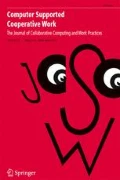Abstract
This paper presents the latest developments of the MadeIn 'Coop method for modelling the human-machine and human-human co-operation process, and an application of this method for the design of a more co-operative version of the C3I System CHEOPS. We first consider that the design of software systems for organizations is tied more and more to the perspective of ‘compound’ Knowledge Production Systems that link humans and machines engaged in a co-operative problem solving process. After exposing the four principles upon which MadeIn 'Coop rests for modelling co-operation, we present an artificial problem solving dialogue between CHEOPS and its users. Consistent with the ‘Group Cognitive Processes Theory’ framework, we propose a dialogue analysis according to two complimentary points of view: the ‘Collective Problem Solving model’, and the ‘Coordination model’. This analysis should help system designers to identify new system functionalities to assist problem solving.
Similar content being viewed by others
References
Armengaud, F. (1985): La Pragmatique, Que saisje?. Paris: PUF.
Baeker, R.M. (1993): Readings in Groupware and Computer-Supported Cooperative Work. San Mateo, CA: Morgan Kaufmann.
Buchanan, B.G. and Wilkins, D.C. (1993): Readings in Knowledge Acquisition and Learning. San Mateo: Morgan Kaufmann.
Cahour, B. (1991): La modélisation de l'interlocuteur: elaboration du modèle et effets au cours de dialogues de consultation. Thèse de l'Université de Paris VIII.
Cohen, P.R. and Levesque, H.J. (1990): Rational Interaction as the Basis for Communication. In Intentions in Communication. Cambridge, MA: MIT Press, pp. 221–255.
COOP (1992): Bibliographic commentée du groupe COOP (Version 1): Modélisation de la coopération homme-machine dans la résolution de problème pour représenter et acquérir les connaissances dans les systèmes d'assistance. Rapport de Recherche EHEI, No. 92-11-3.
COOP (1993): COOP Research Group Project: Modeling of Man-Machine Co-Operation for the Design of Knowledge-Based Support Systems. Rapport de Recherche 93/25, LAFORIA, Université Pierre et Marie Curie.
Crozier, M. and Friedberg, E. (1977): L'Acteur et le Systeme. Paris: Edition du Seuil.
Darses, F., Falzon, P. and Robert, J.M. (1993): Cooperating Partners: Investigating Natural Assistance. Proceedings of HCI'93, Orlando, U.S.A., August 8–13.
DeGreef, H.P. and Breuker, J.A. (1992): Analysing System-User Cooperation in KADS. Knowledge Acquisition, vol. 4, pp. 89–108.
Ellis, C., Gibbs, S. and Rein, G. (1991): Groupware: Some Issues and Experiences. Communications of the ACM, vol. 34, no. 1, pp. 38–58.
Falzon, P. (1989): Ergonomie cognitive du dialogue. Grenoble: Presses Universitaires.
Falzon, P. and Darses, F. (1992): Les processus de cooperation dans les dialogues d'assistance, 27ème Congrès de la SELF, Lille, 23–25 September.
Hatchuel, A. and Weil, B. (1992): L'Expert et le Systeme. Paris: Economica.
Hatchuel, A. (1994): Apprentissages Collectifs et Activités de Conception. Revue Française de Gestion, Juin-Juillet-Août, pp. 109–120.
Hayes-Roth, B. and Hayes-Roth, F. (1979): A Cognitive Model of Planning. Cognitive Sciences, vol. 3, pp. 275–310.
Hoc, J.M. (1987): Psychologie Cognitive de la Planification. Grenoble: Presses Universitaires de Grenoble.
Karsenty, L. and Falzon, P. (1992): Spontaneous Explanation in Cooperative Validation Dialogues. Proceedings of the ECAI-92 Workshop on Improving the Use of Knowledge-Based Systems with Explanations, Vienna, August 4.
Malone, T.W. (1987): Modeling Coordination in Organizations and Markets. Management Sciences, vol. 33, no. 10, pp. 1317–1332.
Mintzberg, H. (1979): The Structuring of Organization. Englewood Cliffs, NJ: Prentice Hall.
Miyake, N. (1986): Constructive Interaction and the Iterative Process of Understanding. Cognitive Science, vol. 10, no. 2, pp. 151–177.
Newell, A. (1982): The Knowledge Level. Journal of Artificial Intelligence, vol. 18, pp. 87–127.
Rousseaux, F. (1995): Contribution à une méthodologie d'acquisition des connaissances pour l'ingéniérie des systèmes d'information et de communication: l'exemple de CHEOPS pour l'aide à la gestion de crises collectives á caractère géographique. Mémoire d'habilitation à diriger des recherces. University Paris 6.
Simon, H.A. and Lea, G. (1974): Problem Solving and Rule Induction: A Unified View. In Knowledge and Cognition, Gregg, L.G. (ed.). Lawrence Erlbaum, pp. 105–128.
Terssac, G.De (1992): Autonomic dans le Travail. Paris: PUF.
Winograd, T. and Flores, F. (1986): Understanding Computers and Cognition. Norwood, NJ: Ablex.
Zacklad, M. (1987): Contribution à une psychologie cognitive des activités de résolution de problème en groupe. DEA Processus Cognitifs. Université de Paris 8.
Zacklad, M., Groupe COOP and Rousseaux, F. (1993): Projet GEOCOOP: Conception d'une méthode d'acquisition des connaissances contextuelles et de modèles de coopération: application au développement d'un sys\`teme géographique d'aide à l'estimation du risque et à la gestion de crises. Rapport de Recherche de l'INRIA No. 2052, Octobre.
Zacklad, M. and Groupe COOP: Made In'Coop: Préliminaires pour le développement d'une méthodologie de modélisation de la coopération homme-machine. In Actes de la Conférence ErgoIA, Biarritz 26–28 Octobre, pp. 406–421.
Zacklad, M. and Rousseaux, F. (forthcoming): Modéliser la Coopération dans la Conception des Systèmes de Production de Connaissances: La Méthode MadeIn'Coop, Exemple d'Application au Développement d'un Système d'information et de Commandement. Rapport de Rercherche du LIFAC.
Author information
Authors and Affiliations
Additional information
(C3I) Command Control Communication Intelligence Systems
Rights and permissions
About this article
Cite this article
Zacklad, M., Rousseaux, F. Modelling co-operation in the design of knowledge production systems: The Made In'Coop method. Comput Supported Coop Work 5, 133–154 (1996). https://doi.org/10.1007/BF00133654
Issue Date:
DOI: https://doi.org/10.1007/BF00133654




